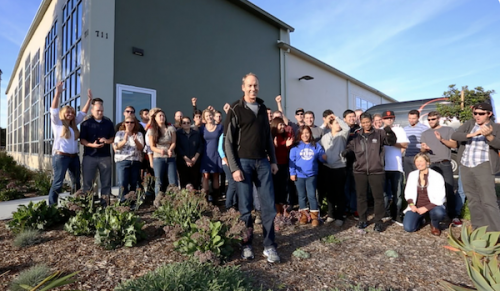MARINA, Calif. (BRAIN) — The bike industry learned just a week ago that many of its Chinese-made products would become subject to a 10 percent tariff, increasing to 25 percent in January. There were only a few product exceptions, and Daniel Emerson's heart sank when he saw they included completed bike lights, in the name of safety, while light components are still subject to the tariff. U.S. Customs began collecting the tariff Monday.
Light & Motion manufactures in the U.S. but uses mostly Chinese components. So Emerson's competitors, almost all of whom manufacture overseas, will pay no additional tariffs on their complete lights, while his costs go up 10 percent.
"Basically the U.S. government is providing a huge boost to our China-based competition, which is virtually every other product on the market. They are telling us very clearly we are not welcome in the U.S.," he told BRAIN on Monday.
While the light exemption took Emerson by surprise last Monday, he's not waiting around to react. He heads to the Philippines in a little over a week to start setting up production there. He said that before the tariff announcement his company had stocked up on parts for U.S. production, which will continue for six or nine months during the transition.
Light & Motion has about 45 employees, including about a dozen in production. The production jobs will likely disappear.
It's an especially painful decision for Emerson because it's not the first time he has moved a company's production overseas. He did the same for a U.S. snowshoe company he worked for before coming to Light & Motion, and that transition was very successful. But he hoped he'd never do it again.
"When the opportunity to join Light & Motion came up, it was exciting to me because I wanted to prove we could do the same here domestically, which we have," he said. He's confident the company will survive and grow with overseas production. "We'll be fine. In some ways we've been swimming upstream here, so maybe it's time to go with the flow," he said.
Emerson said Light & Motion bike lights get about 70-80 percent of their value from Chinese parts, and the rest from U.S. labor and domestic materials. He said raising prices is not an option in a competitive market. "No way. It would sink the company," he said.
Other companies in the bike industry using a mix of imported and domestic parts and materials have been harmed by the trade war and the impact is felt all the more bitterly when those manufacturers have invested in U.S. production, only to see tariffs give their importing competitors an advantage. U.S. component makers like Paul Components, Wheels Manufacturing and others say the tariffs on steel, aluminum and bearings have put them at a disadvantage compared to their overseas competitors. Many components from China are now subject to the 10 percent tariff, but the competition for the U.S. brands more often comes from Taiwan manufacturers, whose products are not subject to any additional tariffs.
In Emerson's view, the damage to companies like his was not accidental.
"This was absolutely intentional. If, right before the midterms, the administration had slapped a 10 percent tariff on consumer products that are widely bought, from Walmart and Target to REI and local bike shops, Americans would have realized very quickly what tariffs mean. So the administration copped out and put it on parts. They didn't have the courage to put it on finished products," he said.
Emerson has little hope that the trade war will encourage a rebirth in U.S. manufacturing. "If we were serious about that, we would be investing in education and community colleges. I can't find people. We have to train them internally.
"I find the actions of this administration to be capricious. There's no planning. The policies seem to be untethered from anything that I can relate to. The reason we are in a trade war is because we have a large trade deficit. But we also have very low unemployment and a booming economy. The deficit is just a number — it's meaningless. So are we willing to trade our low unemployment and strong economy to change a number? Is that what winning looks like?"
Editor's note: Emerson recorded an interview with NPR's All Things Considered on Monday, which can be heard at npr.org or by clicking the box below.


